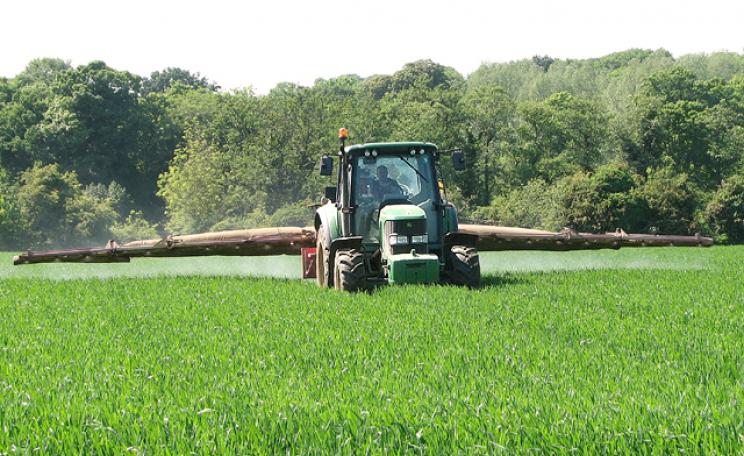There was never any question that these three neonicotinoids had to go. Now the EU must make sure that they are not simply swapped with other harmful chemicals.
A partial ban of three types of neonicotinoids across the European Union (EU) has been extended to cover all outdoor uses, in what campaigners are hoping is a “turning point for the toxins”.
The use of clothianidin, imidacloprid and thiamethoxam has been prohibited in the EU on oilseed rape, spring cereals and sprays for winter cereals since 2013. But they were still allowed to treat sugar beat, various horticultural crops and as seed treatments for winter cereals.
Following Friday’s vote - in which representatives from 16 countries including the United Kingdom supported the European Commission’s proposal for a ban - their use will only be allowed in permanent greenhouses.
Chronically polluted
Franziska Achterberg, a food policy adviser for Greenpeace EU, said: “This is great news for pollinators and our wider environment, but there was never any question that these three neonicotinoids had to go. Now the EU must make sure that they are not simply swapped with other harmful chemicals.”
The three neonicotinoids are “just the tip of the iceberg”, according to Achterberg. Other pesticides, and other neonicotinoids, are just as dangerous for bees and food production, she said. These include four neonicotinoids currently authorised in the EU, and insecticides like cypermethrin, deltamethrin and chlorpyrifos.
Failure to address the wider chemical burden on bees could mean that farmers simply replace banned chemicals with other permitted chemicals that may be just as harmful, warned Greenpeace.
France is to bring in a total ban on neonicotinoids from 1 September, including acetamiprid and thiacloprid, and possibly sulfoxaflor and flupyradifurone, depending on the outcome of discussions. The US Environmental Protection Agency is reviewing use of four neonicotinoids.
Campaigners are concerned that pollution from previous use of neonicotinoids may continue to harm wildlife. Last year, conservation charity Buglife, which has been campaigning since 2009 for neonicotinoids to be banned, found that half of rivers and lakes monitored in England were “chronically polluted” with neonicotinoids from use in agricultural and pet flea treatments.
Initial ban
It wants EU member states to rapidly adopt guidance on improving the EU pesticide approval process produced by scientific advisory body the European Food Safety Authority so that they stop approving new insecticides suspected of being similarly harmful to bees.
There was never any question that these three neonicotinoids had to go. Now the EU must make sure that they are not simply swapped with other harmful chemicals.
However, the National Farmers’ Union (NFU) said that the EU’s decision was “regrettable” and “not justified by the evidence”.
Guy Smith, NFU deputy president, said: “Without neonicotinoids many crops grown in the UK will become less viable, and a ban could simply mean we import more crops from parts of the world where there is no political desire to ban these key insecticides.”
Bayer, which manufactures imidacloprid and clothianidin, said the restrictions were not warranted, because neonicotinoids are safe “when used in accordance with the label instructions”.
The agrochemicals company, together with thiamethoxam manufacturer Syngenta, took the European Commission to the European Court of Justice over its initial ban of neonicotinoids in 2013. The result of the case is due next month.
Flowering crops
“A reversal of the current restrictions could have profound implications for the legal justification of the new proposals,” Bayer said in a statement. "The ban further reduce European farmers' ability to tackle important pests, for many of which there are no alternative treatments available.”
However, Peter Lundgren, an arable farmer with a 100ha farm in Lincolnshire, said that farmers “did not need to panic” about not being able to use neonicotinoids. Lundgren has been managing his farm without neonicotinoids for eight or nine years. “I don’t believe I’ve suffered any worse damage to my crops from not using neonicotinoids. I’ve saved quite a lot of money because the treatment is quite expensive,” he said.
Lundgren has instead encouraged populations of beneficial insects on his farm, which eat pests such as flea beetles and aphids. This has had the added benefit of removing the need for slug pellets, since spiders and beetles eat slug eggs. He is also using companion planting to entice pests onto plants he is happy to sacrifice so that they leave the ones he wants to harvest alone.
“We’ve had a ban on neonicotinoids on flowering crops for a number of years. There were dire warnings of a collapse in production in oil seed rape, but we haven’t actually seen that,” he said.
“There are a number of different opportunities for farmers to protect their crops. There’s also a number of us who have been able to farm reasonably successfully without neonicotinoids, so there is a blueprint. There’s no need to panic!” he added.
This Author
Catherine Early is a freelance environmental journalist and the former deputy editor of the environmentalist. She can be found tweeting at @Cat_Early76.







